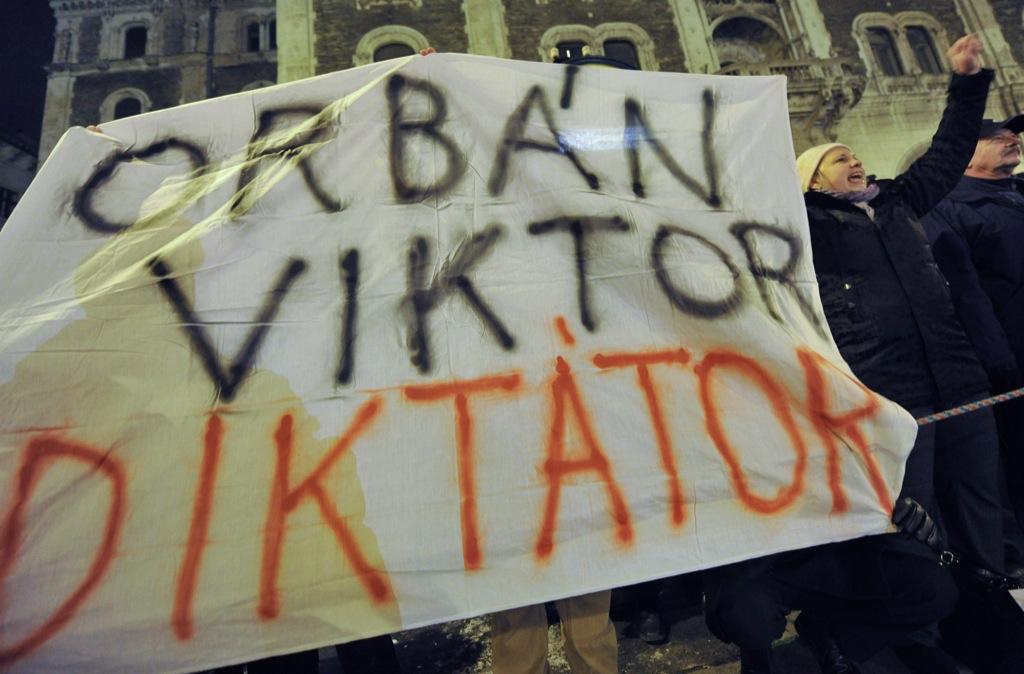Why the EU needs to talk about Viktor
A woman shouts anti-government slogans next to a banner reading “Viktor Orban is a dictator” in front of the Hungarian National Opera on Jan. 2, 2012. Thousands protested against Hungary’s new constitution which critics said curbed democracy, while the governing centre-right government celebrated the new law at a gala event. They protested against the government of Viktor Orban and the controversial new constitution that entered into force on Jan. 1, renaming “the Republic of Hungary” to “Hungary.”
BRUSSELS, Belgium — The war of wills between Viktor Orban and the rest of the world looks likely to come to a head in the next few days.
The Hungarian prime minister seems to have increasingly less room for maneuver as he seeks European Union and International Monetary Fund support to save his country from the looming threat of bankruptcy.
His envoy left empty handed from talks Thursday with the IMF in Washington. He was desperately seeking a $25 billion credit line to keep the economy afloat.
Read more on GlobalPost: New year, new crisis point: Hungary
The EU’s head office expected to initiate a legal process that that could lead to sanctions against Hungary on Tuesday, unless Orban relents over laws that critics see as threatening democracy and damaging any hopes of economic recovery.
“We remain preoccupied that some of that legislation may indeed be in violation of European laws and principles,” Jose Manuel Barroso, president of the European Commission said Friday. “We will use all our powers to make sure Hungary complies.”
The United States and the European Central Bank have joined the chorus of criticism in recent days.
Orban was once a poster boy for democracy in Central Europe, a hero his country’s struggle to end Soviet rule in the 1989. Since his Fidesz party swept to power with a massive majority in 2010 elections, however the man supporters call “Viktator” is close to becoming an international pariah.
Read more on GlobalPost: Occupy Budapest protests confront the "Viktator" in Hungary
Critics claim a raft of laws rushed through Fidesz aim to curtail media freedom, shackle the judiciary, gerrymander future elections and place the Central Bank under government control. His unorthodox economic policies have included nationalizing $12 billion in private pension funds, imposing extraordinary taxes on banks and other companies and forcing international lenders to take losses on foreign currency loans to Hungarians.
The result has been a collapse in confidence in the economy, soaring borrowing costs, a freefall for the forint currency and a junk status rating. Some analysts believe Hungary will run out of money in within the next 6 months unless it gets international help.
But the EU and IMF are unwilling to hand over money unless Orban changes track. EU finance chief Olli Rehn says guarantees on the independence of the Hungarian central back are a “precondition” for any bailout talks.
Orban, however, is known for playing hard ball and European leaders know that letting Hungary go under would have serious repercussions across Europe.
Austrian banks are heavily exposed to Hungary. Germany and hard-pressed Italy would also suffer. Investor confidence in other neighbors like Slovakia, the Czech Republic and Poland is already suffering due to fear of Hungarian contagion. The next few days should tell who blinks first.
